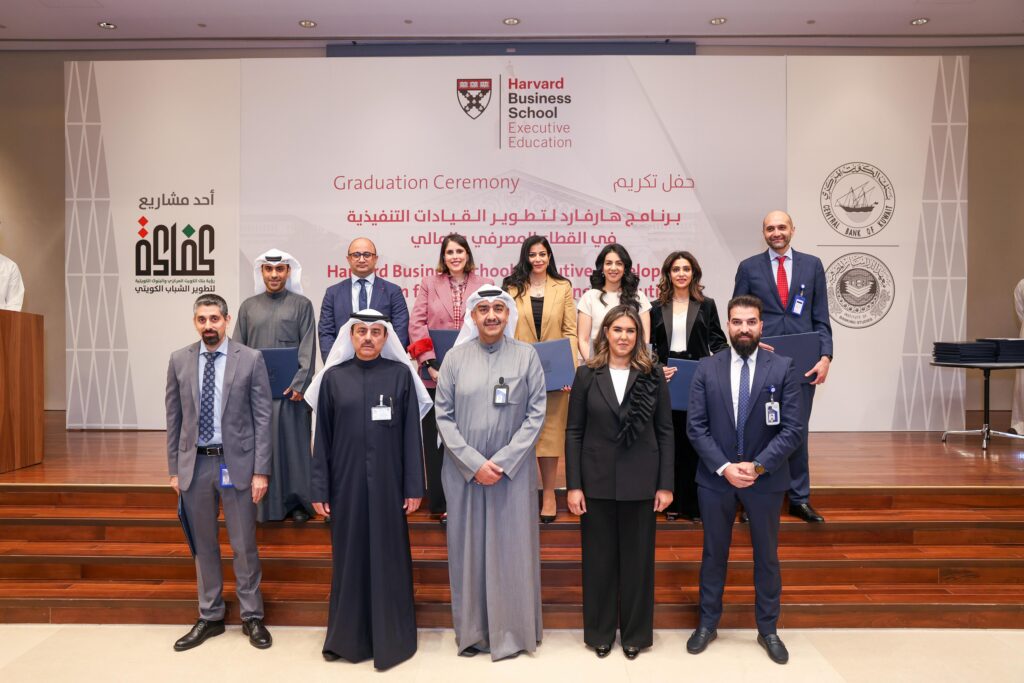28/02/2024
28/02/2024

Kuwait City, Feb 28: National Bank of Kuwait (NBK) proudly celebrated the graduation of its trainees from the fifteenth edition of the Harvard Business School (HBS) Executive Development Program. This milestone marks a significant achievement as part of the Kafa’a initiative initiated by the Central Bank of Kuwait (CBK) in collaboration with Kuwaiti banks. Managed by the Institute of Banking Studies (KIBS), this initiative aims to develop and improve the skills of national talent.
The bank observed significant participation in this edition, with nine trainees from various departments' directors—a record number among participating banks.
The ceremony took place under the patronage of Mr. Basel A. Al-Haroun, the Governor of the Central Bank of Kuwait and Chairman of the Board of Directors of the Institute of Banking Studies. Representatives from Kuwaiti banks, participating companies from both domestic and international spheres, CBK, KIBS, and the honorees were all in attendance.
This year's Executive Development Program, held in the UAE, was themed "Navigating the Future: Leading Financial Institutions in an Era of Innovation and Transformation. The program aimed to cultivate executive leadership within the banking and financial sectors.
The program centered around two primary pillars: "Financial Markets Strategy" and "Leadership." It emphasized the pivotal role of leadership and management in devising and executing financial, technical, and leadership strategies to address challenges. Moreover, it underscored the importance of acquiring the diverse strategic and leadership skills necessary for navigating digital transformation within the financial sector, enabling participants to stay abreast of rapid developments in the field.
The six-day program featured practical case studies relevant to the program's theme and the banking and financial sectors, as well as other industries for which HBS is renowned. These case studies aimed to offer participants a comprehensive array of practical experiences, enhancing their analytical skills and equipping them with tools and methodologies to enhance performance, foster innovation, and shape institutional culture.
The program alternates its location annually among the GCC countries. This approach is designed to cultivate executive leadership within banks and financial institutions across the region, tailored to meet the evolving needs of the banking and financial sectors amidst the dynamic changes in the business landscape.
Moreover, the program sought to familiarize participants with the implications of the global surge in investments aligning with environmental, social, and governance (ESG) standards, emphasizing their significance for the organization. Additionally, it aimed to educate them on optimizing the utilization of emerging tools like AI, managing risk in a data-driven manner, and promoting successful digital transformation. Additionally, it highlighted emerging opportunities in FinTech.
The program featured interactive plenary sessions, simulations, and real-world case studies led by Harvard Business School faculty. These sessions aim to empower leaders to delve into actionable insights and acquire essential tools for effective leadership. The curriculum also emphasized global attention to environmental sustainability, emerging technologies, and strategies for leading successful digital transformations. Furthermore, it addressed the influence of AI on team dynamics and leadership approaches, emphasizing improved communication, leadership in high-pressure, high-profile situations, and supporting diverse talent collaboration.
Commenting on this event, Mr. Emad Al-Ablani, GM – Head of Group Human Resources at National Bank of Kuwait (NBK) said: “Our engagement in the “Kafa’a” initiative underscores NBK’s commitment to investing in human capital, ensuring the development of skilled national banking leaders in alignment with the latest and highest international standards."
“Creating a flexible, dynamic, and high-performing workforce entails empowering and nurturing future leaders, equipping them with the most effective and up-to-date programs. Hence, we prioritize participation in initiatives and programs that align with the bank’s long-term goals and bolster sustainability efforts in human resources,” Al-Ablani added.
He emphasized NBK’s unwavering commitment to furnishing future leaders with the necessary training programs and capabilities. These initiatives aim to cultivate adaptability, inspire others, and deliver advanced and innovative services, thus solidifying the bank's leadership position at the local level.


